
10 Ways Contact Center AI Boosts Sales Performance
GeneralKey Highlights:
- Agentics specialises in customised voice AI solutions that enhance communication in contact centres, improving both internal and external interactions.
- 18% of support leaders plan to invest in generative AI for hyper-personalization to improve client engagement.
- AI can automate routine inquiries, allowing agents to focus on complex conversations, thereby boosting sales performance.
- 64% of clients prefer businesses not to use AI for service, while 75% express concerns about data privacy.
- AI-driven automation can increase sales representatives’ productivity by managing repetitive tasks, allowing more time for high-value interactions.
- Data-driven insights from AI enable sales teams to tailor their strategies, leading to a reported 5-8 times higher ROI.
- Optimised call routing through AI improves lead management by directing calls to the most suitable representatives based on client needs.
- Real-time coaching provided by AI enhances agent performance, with a potential increase in conversion rates by up to 20%.
- Sentiment analysis allows AI to assess client emotions, enabling tailored responses that enhance satisfaction and sales outcomes.
- AI integration can reduce operational costs by up to 30% through automation and streamlining workflows.
- Proactive engagement strategies powered by AI anticipate client needs, leading to improved satisfaction and loyalty.
- 24/7 customer support through AI solutions ensures timely assistance, crucial for maintaining a competitive edge in customer service.
Introduction
In a rapidly evolving digital landscape, the integration of artificial intelligence (AI) into contact centres is revolutionising how businesses communicate and engage with customers. By harnessing advanced voice AI solutions, organisations can streamline communication processes, enhance customer interactions, and ultimately drive sales performance.
- From automating routine tasks to employing real-time coaching and sentiment analysis, AI serves not merely as a tool for efficiency but as a catalyst for personalised customer experiences.
- As companies increasingly recognise the value of AI in optimising operations and fostering customer loyalty, a pivotal question emerges: how can these technologies be effectively implemented to maximise their impact?
This article delves into the transformative role of AI in contact centres, exploring its potential to reshape customer engagement strategies and elevate sales outcomes.
Agentics: Streamline Communication with Tailored Voice AI Solutions
Agentics excels in developing customised voice AI solutions that optimise communication processes within contact centre AI. By leveraging cutting-edge voice recognition and natural language processing technologies, businesses can significantly enhance both internal and external communications. This transformation not only boosts operational efficiency but also empowers sales teams to concentrate on high-value interactions, ultimately elevating sales performance. For instance, automated responses can efficiently manage routine inquiries, allowing agents to dedicate their expertise to more complex conversations that necessitate a human touch.
Recent statistics reveal that 18% of support leaders intend to invest in generative AI for hyper-personalisation, underscoring the growing recognition of AI’s role in improving client engagement. Furthermore, a case study on reducing churn through personalised recommendations illustrates how predictive analytics can identify at-risk customers, enabling businesses to offer tailored solutions, such as discounted renewal plans, thereby strengthening customer loyalty.
Industry leaders emphasise that 72% of CX leaders expect AI agents to embody their brand’s identity, reflecting its values and voice. This underscores the importance of training teams to effectively utilise AI tools, ensuring smooth adoption and integration. As voice AI continues to advance, its impact on communication efficiency in sales and contact centres, particularly through contact centre AI, becomes increasingly evident, making it an essential component for businesses aiming to thrive in a competitive landscape.
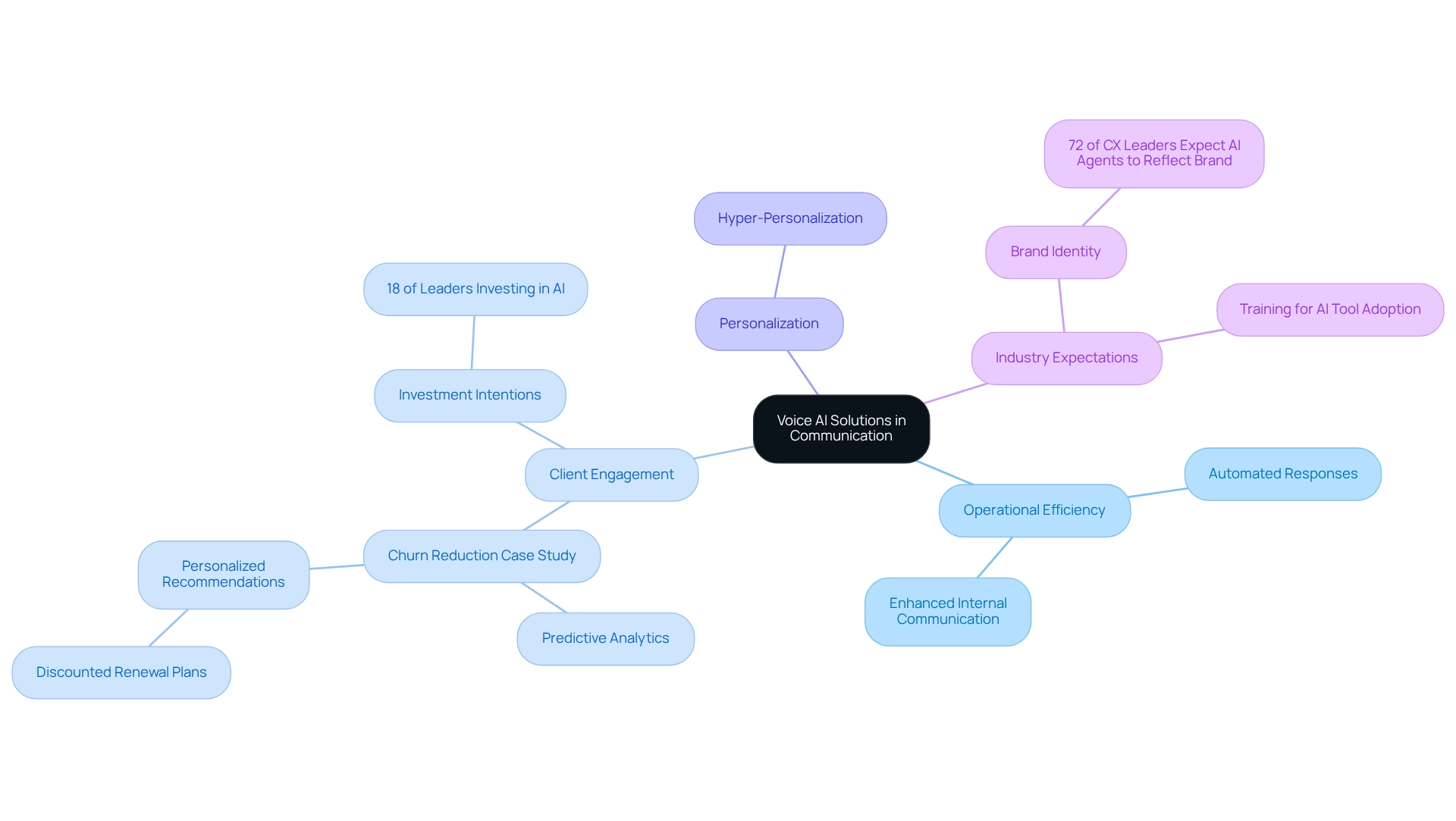
Enhanced Customer Engagement through AI-Driven Interactions
AI-driven communications are revolutionising client engagement by delivering highly tailored experiences. By analysing client data, AI customises conversations based on past interactions, preferences, and behaviours. This level of personalisation not only enhances client satisfaction but also cultivates loyalty, leading to increased conversion rates. However, a significant concern remains:
- 64% of clients prefer businesses to refrain from using AI for service entirely.
- Furthermore, 75% of consumers express worries about data privacy in relation to AI, a critical issue organisations must address to build trust.
Agentics’ tailored voice AI solutions specifically tackle these concerns by ensuring secure data handling and providing options for human-like interactions. For instance, AI-enabled support teams have demonstrated a notable rise in productivity, with agents managing 13.8% more inquiries per hour. Organisations investing in AI are better positioned to optimise operations and enhance client satisfaction. A prime example is Bank of America’s AI-driven virtual assistant, Erica, which has successfully handled over 50 million customer interactions. The integration of contact centre AI tools guarantees that customer needs are met promptly and accurately, ultimately driving engagement and satisfaction.
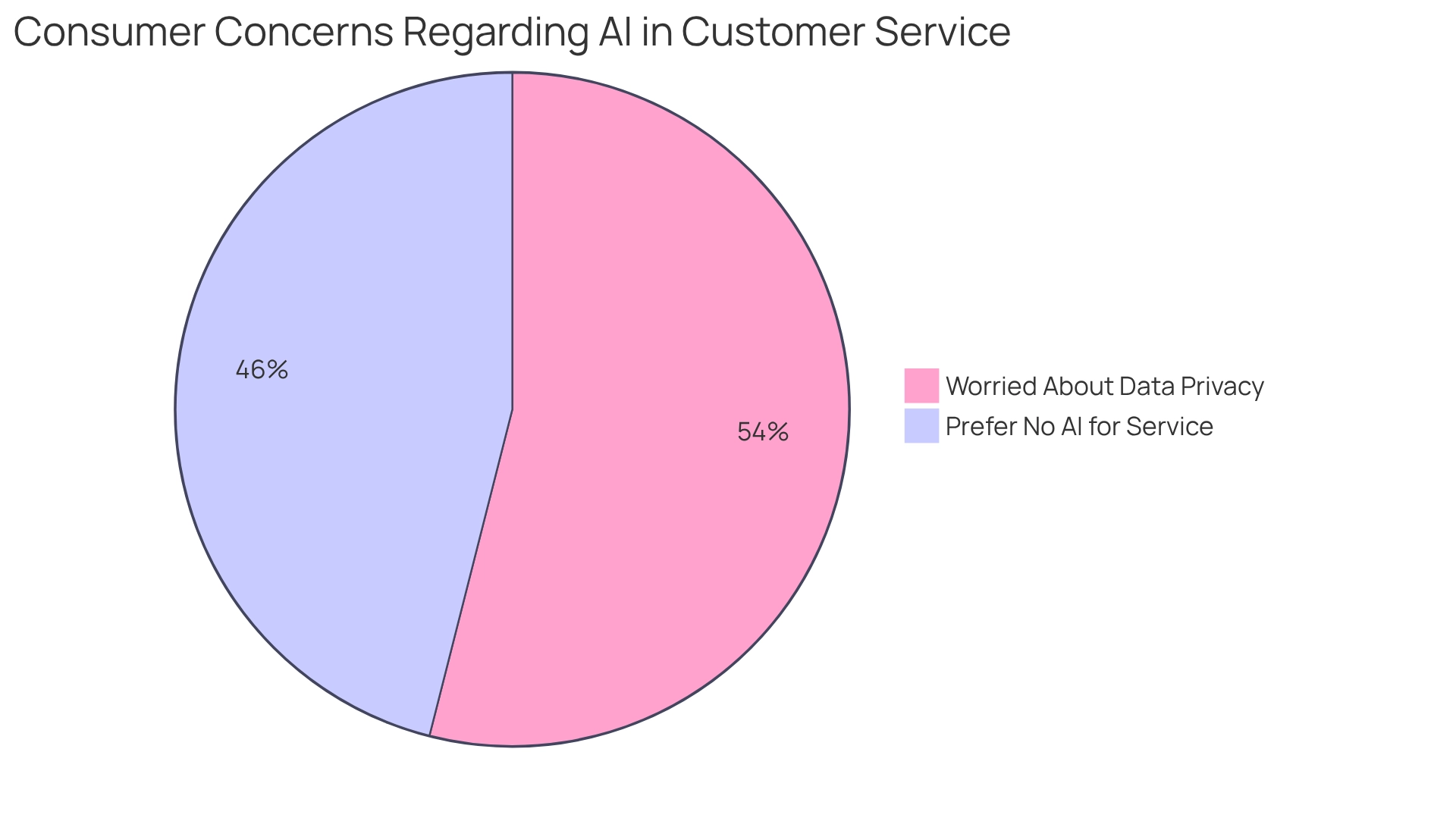
Automation of Routine Tasks for Increased Sales Focus
Automating routine tasks such as data entry and call logging empowers sales representatives to focus on selling rather than administrative duties. AI technologies excel at managing these repetitive tasks, significantly mitigating the risk of human error and ensuring that individuals have accurate, real-time information readily accessible. For example, automated scheduling tools effectively handle follow-up calls, enabling representatives to allocate more time to engaging with prospects and finalising agreements.
The impact of automation on revenue productivity is substantial. Statistics indicate that representatives can save significant time through automation, allowing them to concentrate on high-value tasks. A recent study revealed that 72% of HR staff initially viewed automation tools positively, illustrating a broader acceptance of AI in enhancing workplace efficiency.
Expert opinions further underscore the advantages of integrating AI into commercial processes. Many marketing professionals advocate for a balanced approach, recognising that while AI should facilitate prospecting, human oversight remains crucial. A case study on the perception of AI in commercial roles found that 69% of professionals in this sector believe AI should support their efforts, yet they caution against over-reliance on technology. This perspective highlights the importance of leveraging AI to alleviate administrative burdens while maintaining personal connexions in customer interactions.
As we approach 2025, the trend toward automation in commerce is not merely a passing phase; it signifies a fundamental transformation within the industry. Contact centre AI tools designed to minimise administrative tasks are becoming indispensable, enhancing productivity and improving focus on critical business activities. By reducing human errors in administrative processes, AI not only optimises operations but also fosters a more efficient commercial environment, ultimately leading to improved performance and client satisfaction.
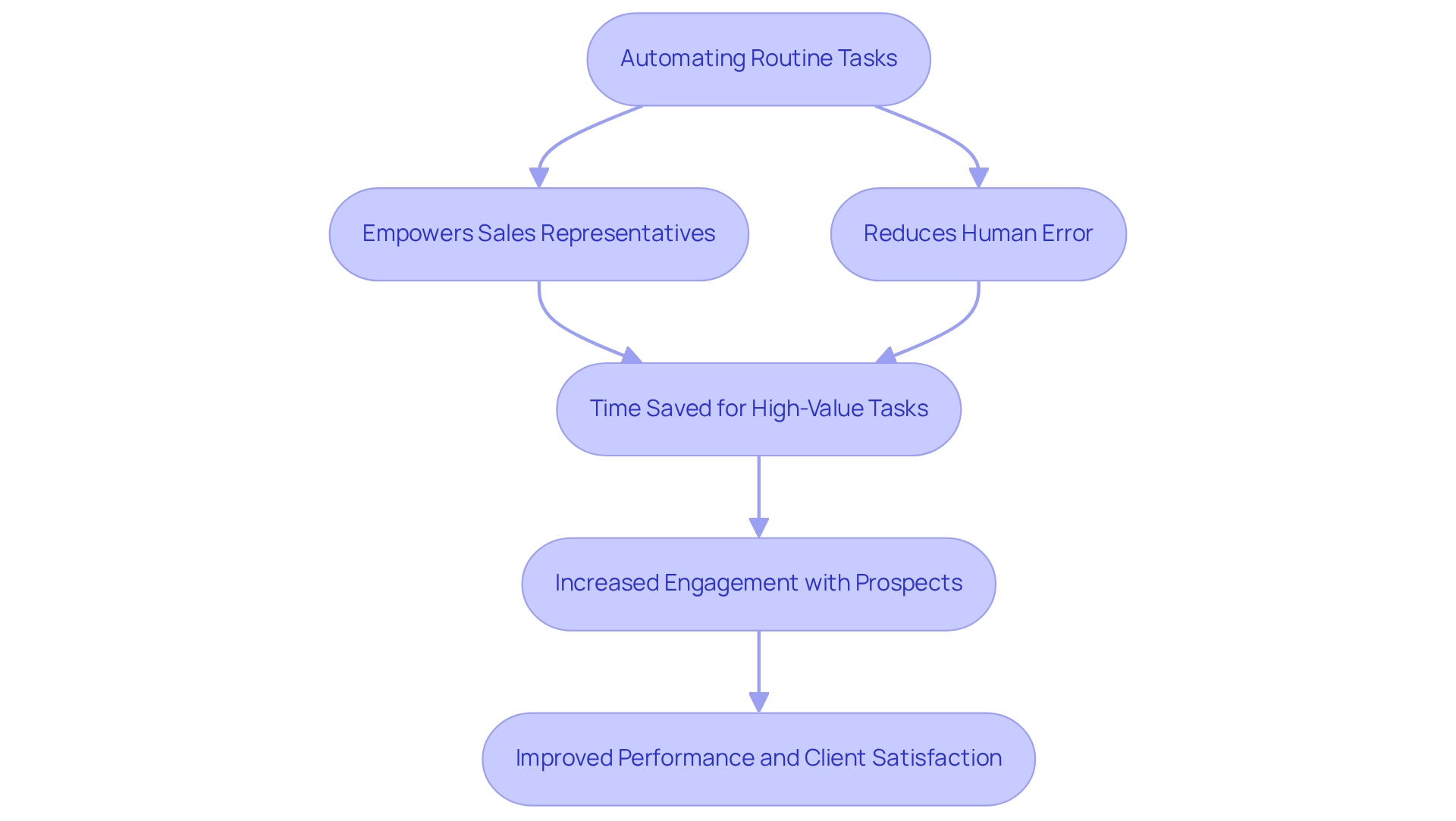
Data-Driven Insights for Informed Sales Strategies
Data-driven insights are essential for crafting informed marketing strategies. By scrutinising client interactions and transaction data, contact centre AI can identify trends, preferences, and challenges. This intelligence empowers sales teams to tailor their approaches, ensuring they address client needs effectively.
For instance, predictive analytics can anticipate customer behaviour, allowing agents to prioritise high-potential leads and refine their outreach efforts. Businesses that harness data-driven strategies report an impressive 5-8 times higher ROI, underscoring the financial benefits of informed marketing decisions.
Furthermore, 43% of marketers indicate that data integration poses their greatest challenge in 2024, highlighting the obstacles organisations encounter in executing these strategies. A compelling example is Slevomat, which shifted from an internal data reporting system to the Keboola data innovation platform. This transition not only provided access to up-to-date, cleaned information but also facilitated data-driven decision-making across the organisation, resulting in a 23% increase in revenue.
As we near 2025, the importance of analytics in revenue performance cannot be overstated. By leveraging predictive analytics, contact centre AI can refine sales strategies, ultimately driving improved results and enhancing client satisfaction.
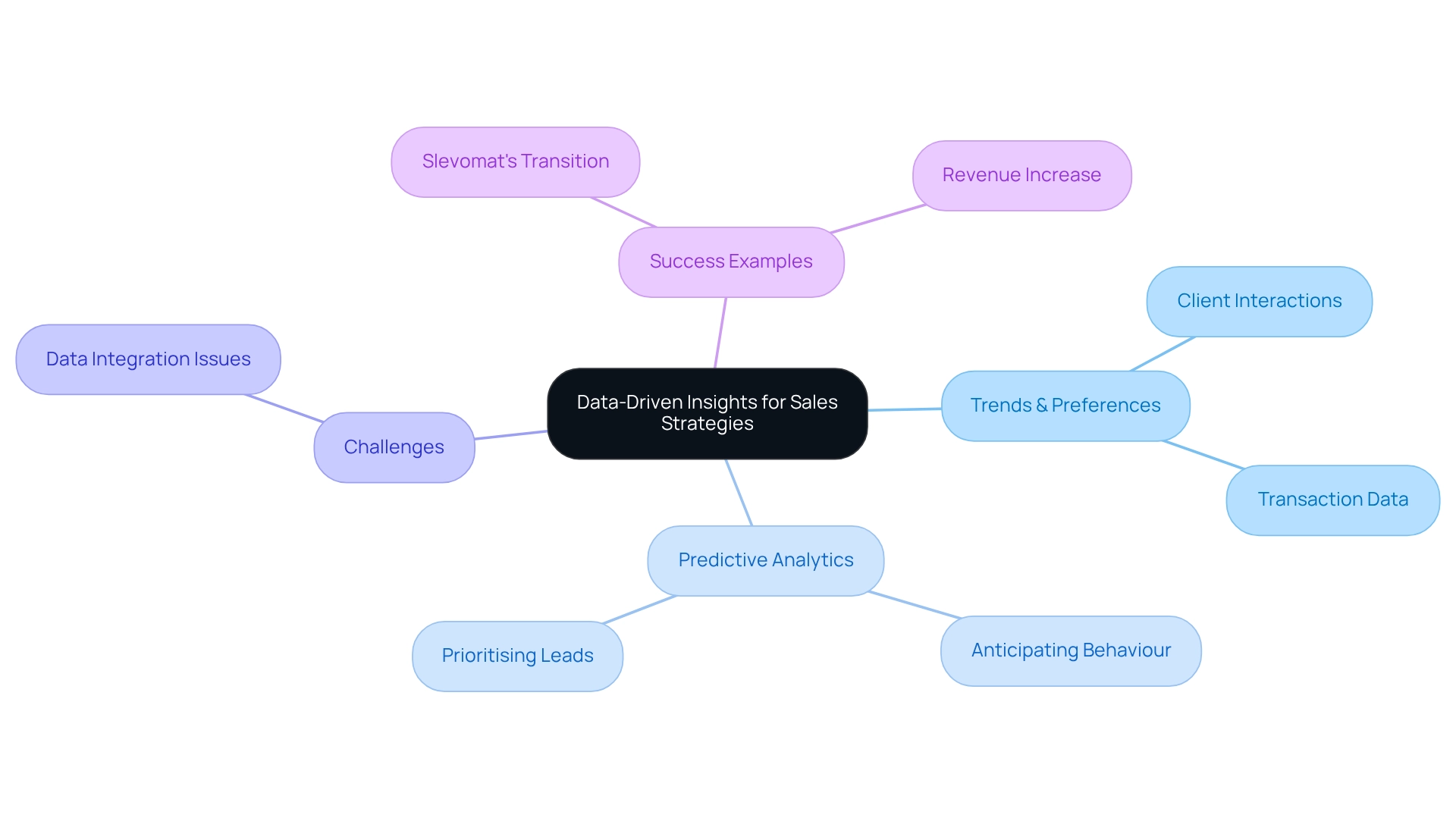
Optimized Call Routing for Efficient Lead Management
Optimised call routing is crucial for enhancing lead management within contact centres. AI-driven systems, such as those offered by Agentics, analyse various factors, including representative availability, expertise, and specific client needs, to direct calls to the most suitable representatives. This strategic approach not only reduces client wait times but also significantly increases the likelihood of successful conversions.
For example, skill-based routing allows intricate inquiries to be addressed by agents with the relevant expertise, resulting in improved client satisfaction and better sales outcomes. Recent advancements in call routing technology, particularly CXone ACD’s omnichannel routing capabilities, further enhance this effectiveness by ensuring calls are directed based on data-driven insights. Consequently, organisations can anticipate a notable rise in first-call resolution rates, leading to a more efficient and productive sales process.
It is essential to recognise that nearly two-thirds (58%) of consumers will sever ties with a business due to inadequate service, underscoring the critical need for efficient call routing. Additionally, representatives must have access to client information to tailor interactions effectively, which is vital for optimising lead management.
Sales directors should seriously consider implementing Agentics’ contact centre AI for call routing systems to enhance their lead management processes and improve overall client satisfaction.
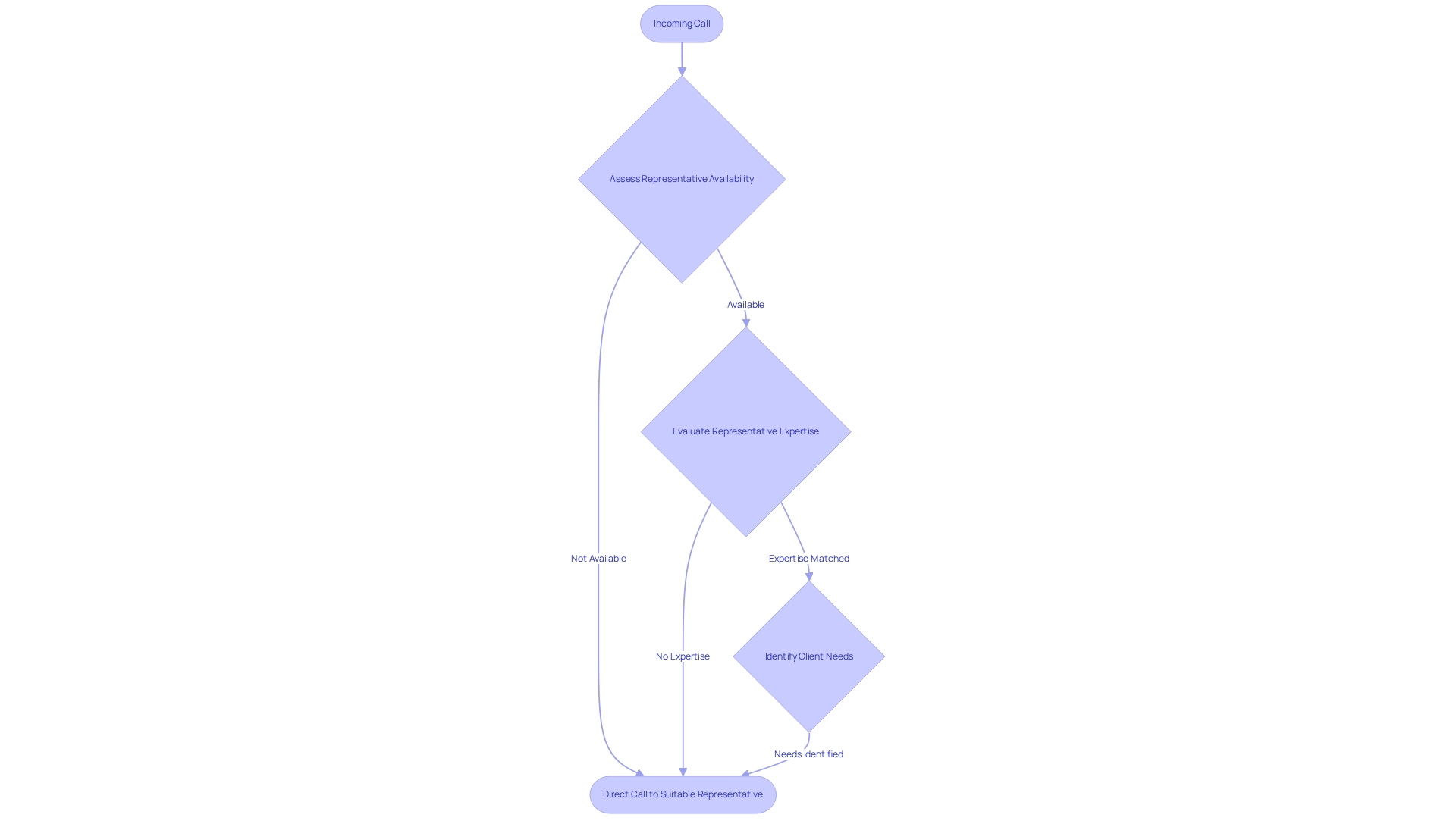
Real-Time Coaching to Elevate Agent Performance
Real-time coaching stands as a transformative tool for enhancing representative performance in contact centres. AI-driven systems deliver immediate feedback during calls, enabling representatives to adjust their strategies in real-time based on client interactions. For instance, when a representative faces a challenging objection, the system can swiftly suggest effective rebuttals, empowering the representative to respond with confidence. This timely assistance not only boosts staff morale but also significantly enhances the customer experience, ultimately leading to improved revenue outcomes.
Statistics reveal that organisations leveraging real-time coaching experience a notable increase in staff performance. Research indicates that representatives receiving prompt feedback during calls can elevate their conversion rates by as much as 20%. Additionally, training specialists underscore the significance of timely feedback, highlighting its role in fostering a culture of continuous improvement and learning within teams.
A compelling case study in this arena is Telstra, which has adeptly integrated AI to enhance client engagements. By employing AI feedback systems, Telstra has improved operational efficiency and service delivery, exemplifying the potential of real-time coaching in driving performance metrics.
Integrating real-time coaching tools not only equips sales representatives with the essential skills to excel but also aligns with the growing trend of AI implementation in service sectors. As companies like Yum! Brands prepare to roll out AI-driven voice-ordering technology across multiple locations, the emphasis on immediate, actionable feedback becomes increasingly crucial for sustaining a competitive advantage in the marketplace.
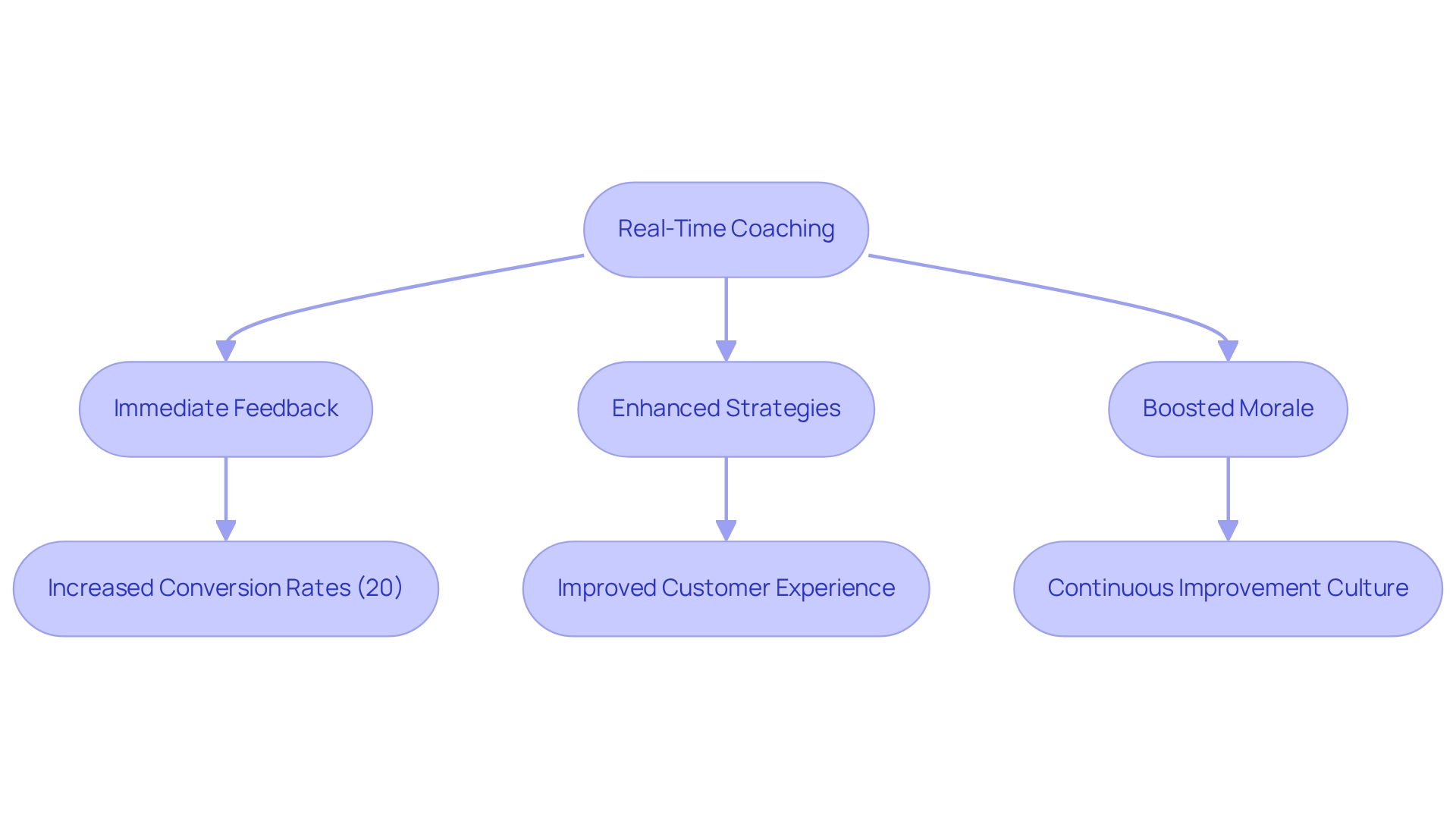
Sentiment Analysis for Tailored Customer Interactions
Sentiment analysis harnesses the power of AI to assess client emotions during interactions, enabling representatives to tailor their responses with precision. By analysing vocal tone, word choice, and other emotional cues, AI delivers critical insights into sentiments surrounding products or services. This capability empowers representatives to modify their approach—whether by adopting a more empathetic tone or providing additional information to alleviate concerns.
For instance, when sentiment analysis indicates a client is frustrated, agents can prioritise swift issue resolution to boost satisfaction. Such personalised interactions not only enhance client satisfaction but also significantly increase the likelihood of closing transactions.
Organisations that implement sentiment analysis, including those utilising Agentics’ contact centre AI solutions, report a remarkable improvement in engagement metrics, with customised responses leading to elevated revenue outcomes. By integrating emotional intelligence into sales discussions, companies can forge stronger relationships with clients, ultimately driving improved sales performance.
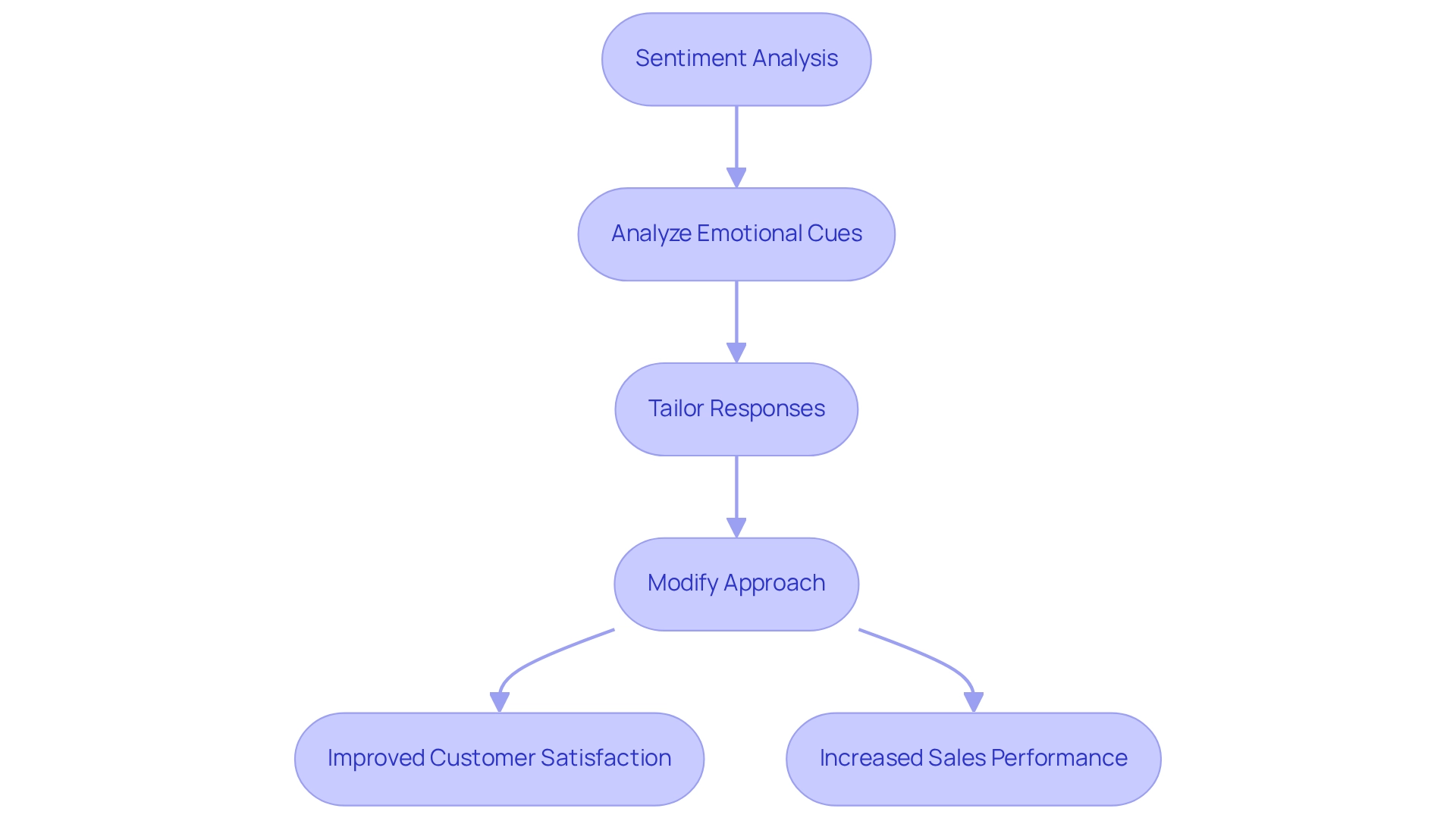
Cost Reduction through AI Implementation in Contact Centers
The integration of contact centre AI offers substantial opportunities for cost reduction. By automating routine tasks and streamlining workflows, organisations can significantly decrease staffing requirements and operational expenses. For instance, AI chatbots excel at managing basic inquiries, which reduces the volume of calls that require human intervention. This not only leads to lower costs but also enables human representatives to concentrate on more complex issues that necessitate their expertise, thereby enhancing service quality and boosting sales performance.
Statistics reveal that companies utilising contact centre AI solutions have achieved operational cost reductions of up to 30%. A notable example is Yum! Brands, which plans to implement AI voice-ordering systems in 500 locations by mid-2025, illustrating a practical application of AI aimed at cost reduction. Furthermore, AI-driven analytics can elevate representative performance by providing real-time recommendations based on client interactions, a strategy proven to enhance efficiency and reduce training expenses.
Case studies indicate that organisations leveraging AI technologies have successfully automated up to 70% of routine inquiries, allowing for a more agile response to client needs. The case study titled ‘Artificial Intelligence Integration in Contact Centres’ highlights how contact centre AI aids in analysing client data, improving agent performance, and delivering real-time suggestions, thereby addressing critical business needs. This transition not only boosts client satisfaction but also yields financial benefits, as organisations can allocate resources more effectively.
Expert insights underscore the importance of the synergy between AI, machine learning, and data analytics in enhancing customer service experiences while simultaneously lowering operational costs. Deloitte’s investment in AI, with its workforce being trained as AI technologists, showcases the industry’s dedication to optimising services through advanced technologies. Financial analysts have noted that the economic advantages of AI in commercial environments are significant, with many organisations reporting a remarkable return on investment within the first year of implementation. Ultimately, the strategic deployment of contact centre AI is a transformative approach for reducing costs and driving sales performance.
Proactive Engagement Strategies Powered by AI
Proactive engagement strategies driven by contact centre AI empower contact centres to anticipate client needs and address them before they arise. By harnessing advanced data analysis and interaction history, AI systems can pinpoint potential issues and suggest timely interventions. For instance, if a client frequently inquires about a specific product, the AI can alert agents to proactively reach out with relevant information or customised offers. This anticipatory approach not only boosts client satisfaction but also significantly elevates conversion rates, as clients feel valued and understood.
Research indicates that organisations employing AI-driven proactive engagement strategies witness substantial improvements in satisfaction metrics. By shifting from reactive to proactive service models, businesses can foster stronger client loyalty and trust—essential components for long-term success. A case study on predictive engagement illustrates how companies that analyse client behaviour to anticipate needs can enhance engagement and satisfaction, moving away from traditional reactive service methods.
Furthermore, expert insights underscore the growing importance of empathy analysis in client experience (CX) strategies, with numerous CX leaders recognising its potential to nurture deeper relationships with clients. As contact centre AI continues to refine workflows and assist agents in addressing client requests, the overall experience improves, highlighting the critical importance of anticipating client needs in sales and service.
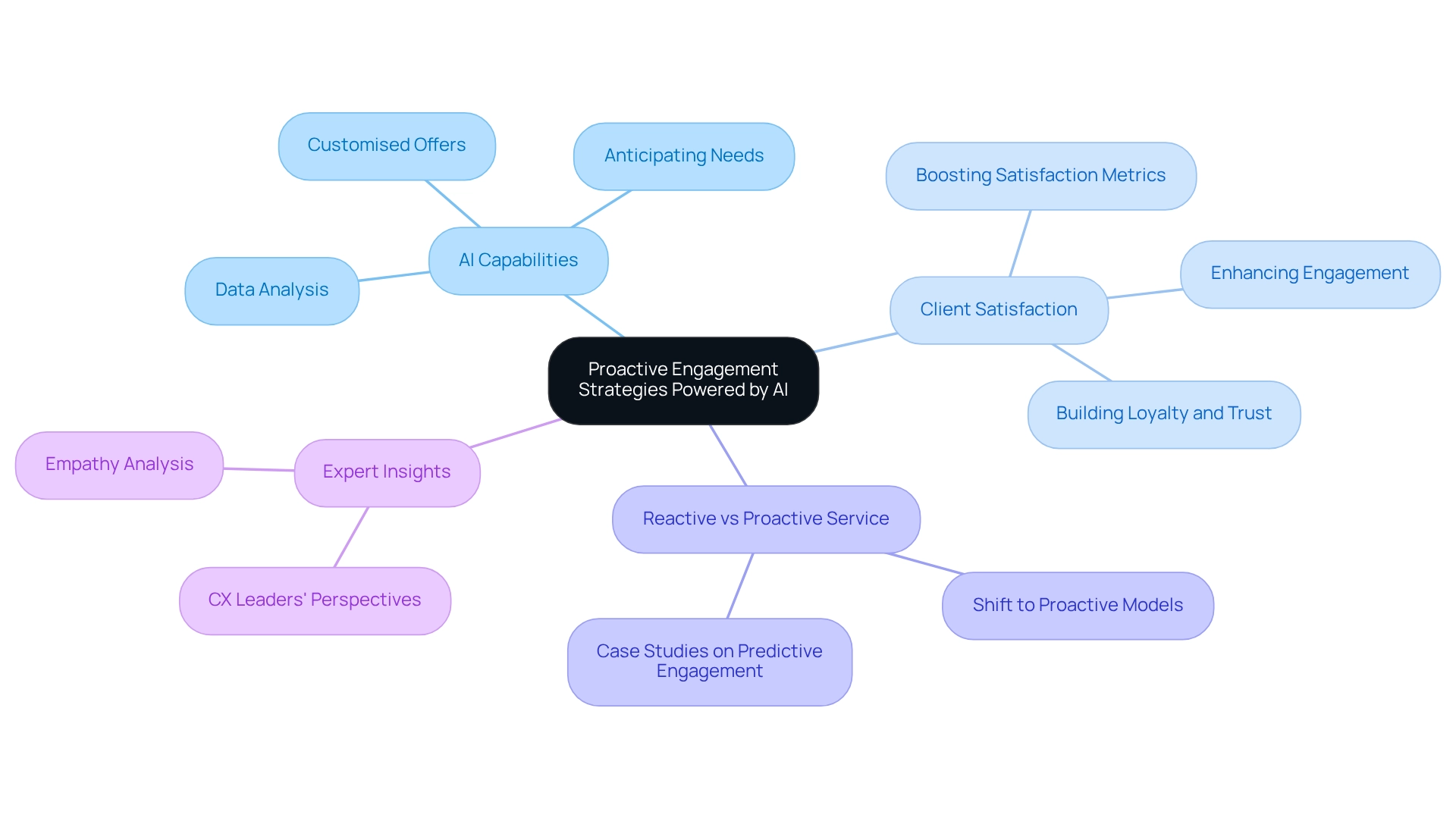
24/7 Customer Support for Enhanced Service Quality
Offering 24/7 assistance is essential for enhancing service quality in contact centres. AI-driven solutions, such as chatbots and virtual assistants, are part of contact centre AI that empowers businesses to address client inquiries at any hour, ensuring timely assistance. This continuous availability significantly boosts client satisfaction and enables organisations to capture leads beyond traditional business hours. For instance, an individual with a product inquiry late at night can receive prompt responses, thereby increasing the likelihood of conversion. Furthermore, 64% of support specialists report that AI enhances personalisation in communications, which is critical for fostering client loyalty. In today’s competitive landscape, where 51% of consumers expect businesses to be accessible around the clock, implementing contact centre AI solutions for 24/7 support is not merely beneficial but essential for maintaining a competitive edge.
To effectively implement AI-driven 24/7 support, businesses should consider the following actionable tips:
- Integrate chatbots to manage common inquiries, allowing human agents to concentrate on complex issues.
- Utilise data analytics to tailor client interactions and elevate service quality.
- Regularly update AI systems to ensure they align with evolving customer needs and expectations.
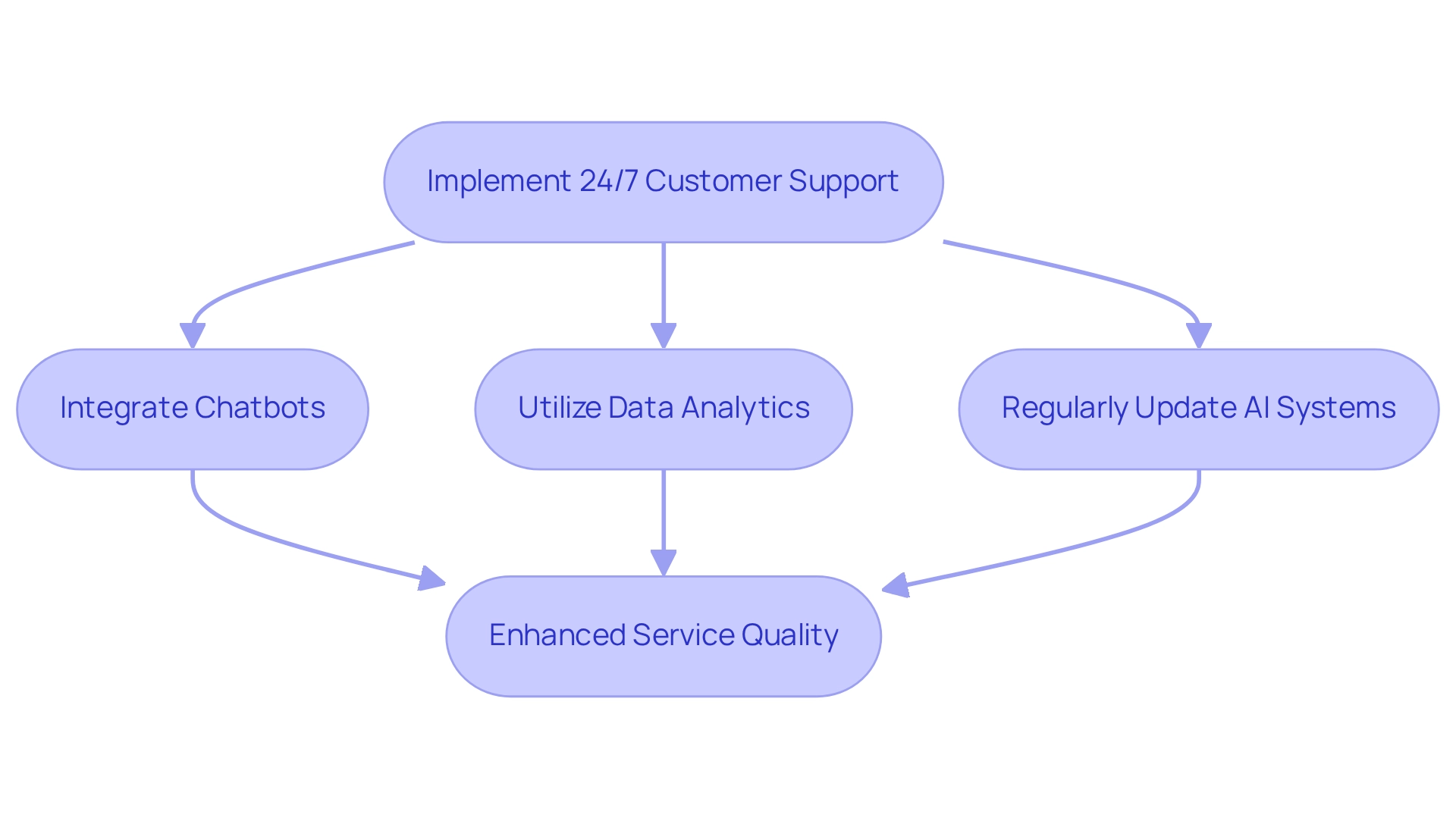
Conclusion
The integration of artificial intelligence in contact centres is fundamentally transforming the landscape of customer engagement and sales performance. By deploying tailored voice AI solutions, organisations can streamline communication, enhance agent productivity, and foster deeper connexions with customers. The automation of routine tasks allows sales teams to focus on high-value interactions, while data-driven insights inform strategies that drive conversion rates and improve customer satisfaction.
AI-driven tools, such as real-time coaching and sentiment analysis, empower agents to perform at their best, adapting to customer needs with greater precision. The ability to provide 24/7 support through AI ensures that businesses remain accessible, capturing leads and enhancing service quality at all hours. Additionally, proactive engagement strategies enable organisations to anticipate customer needs, creating a more personalised experience that builds loyalty and trust.
As companies increasingly recognise the financial and operational benefits of AI, the question of effective implementation becomes paramount. By embracing these technologies, businesses not only optimise their operations but also position themselves for long-term success in a competitive market. The future of customer engagement lies in harnessing the power of AI, ensuring that organisations can meet evolving customer expectations while driving sales performance to new heights.
Frequently Asked Questions
What are Agentics’ main offerings in voice AI solutions?
Agentics specialises in developing customised voice AI solutions that optimise communication processes within contact centres, enhancing both internal and external communications.
How does voice AI improve sales performance?
Voice AI allows for automated responses to routine inquiries, enabling sales teams to focus on high-value interactions, which ultimately elevates sales performance.
What recent trends indicate the growing use of AI in client engagement?
Recent statistics show that 18% of support leaders plan to invest in generative AI for hyper-personalisation, highlighting the recognition of AI’s role in improving client engagement.
How can predictive analytics help businesses retain customers?
Predictive analytics can identify at-risk customers, allowing businesses to offer tailored solutions, such as discounted renewal plans, which can strengthen customer loyalty.
What do CX leaders expect from AI agents?
72% of CX leaders expect AI agents to embody their brand’s identity, reflecting its values and voice, which emphasises the importance of proper training for teams using AI tools.
What are the benefits of AI-driven communications for customer engagement?
AI-driven communications provide highly tailored experiences by analysing client data, enhancing satisfaction and loyalty, and leading to increased conversion rates.
What concerns do clients have regarding AI usage in service?
64% of clients prefer businesses to avoid using AI for service, and 75% express concerns about data privacy related to AI.
How does Agentics address client concerns about AI?
Agentics’ tailored voice AI solutions ensure secure data handling and offer options for human-like interactions to build trust with clients.
What impact does automation have on sales representatives’ productivity?
Automation of routine tasks allows sales representatives to focus on selling rather than administrative duties, significantly increasing their productivity.
What is the general perception of automation tools among HR staff?
A recent study revealed that 72% of HR staff initially viewed automation tools positively, indicating a broader acceptance of AI in enhancing workplace efficiency.
How do marketing professionals view the role of AI in commercial processes?
Many marketing professionals advocate for a balanced approach, believing that while AI should facilitate prospecting, human oversight remains crucial.
What is the significance of automation in the commerce industry as we approach 2025?
The trend toward automation signifies a fundamental transformation within the industry, making contact centre AI tools essential for enhancing productivity and improving focus on critical business activities.
Enjoyed this post? Share it with your network!
10 Best AI Sales Tools to Boost Your Team’s Performance

Discover the top 10 best AI sales tools to enhance team performance and drive revenue growth.
Mastering Test Call Numbers: A Step-by-Step Guide for Sales Directors

Elevate your communication with our guide on mastering test call numbers for sales success.
7 Ways Automated Outbound Calls Boost Sales Performance

Discover how automated outbound calls enhance sales performance and streamline communication.
